Alaskan Shepherd
Canis lupus
This dog’s Malamute ancestors once came to America across the Bering Strait.
Advertisement
Alaskan Shepherd Scientific Classification
- Kingdom
- Animalia
- Phylum
- Chordata
- Class
- Mammalia
- Order
- Carnivora
- Family
- Canidae
- Genus
- Canis
- Scientific Name
- Canis lupus
Read our Complete Guide to Classification of Animals.
Alaskan Shepherd Conservation Status
Alaskan Shepherd Facts
- Fun Fact
- This dog’s Malamute ancestors once came to America across the Bering Strait.
- Temperament
- Loyal, attentive, and hard-working
- Diet
- Omnivore
Alaskan Shepherd as a Pet:
- General Health
- Energy Level
- Shedability
- Trainability
- Intelligence
- Tendency to Chew
- Size
- Family and kid friendliness
- Yappiness / Barking
- Moderate
- Separation Anxiety
- Moderate
- Preferred Temperature
- Cold climate
- Exercise Needs
- High
- Friendly With Other Dogs
- Moderate
- Pure bred cost to own
- $300 to $1,000
- Dog group
- Working
- Male weight
- 65-85 lbs
- Female weight
- 60-75 lbs
This post may contain affiliate links to our partners like Chewy, Amazon, and others. Purchasing through these helps us further the A-Z Animals mission to educate about the world's species.
View all of the Alaskan Shepherd images!
Both the Alaskan Shepherd’s parents, the Alaskan Malamute and German Shepherd, were bred to have a wolf-like appearance (although the German Shepherd is a more recent breed, having been created in the 19th century).
The Alaskan Shepherd is a hybrid crossbreed dog that blends together two hefty breeds: the Alaskan Malamute and the German Shepherd. The breed most likely originated in the early 1900s, in the United States, when both of its parent breeds were popular. The Alaskan Malamute is a big, intelligent working breed, originally bred as a sled dog in the Arctic, with a confident, dignified demeanor and a loyal bearing. It descended from the wolf dogs that came across the Bering Strait thousands of years ago. The German Shepherd is another intelligent working dog that now serves as a police dog, service dog, and general companion in the home.
See all of our expert product reviews.
Because the traits of both breeds synergize well together, the result is the big, loyal, and hard-working Alaskan Shepherd. This mix is characterized by a long muzzle, erect and pointed ears, a long and plumed tail, and large paws with heavy padding. The straight, dense double coat of fur can come in a variety of different colors, including black, brown, white, silver, cream, blue, gray, red, and sable. Eye colors can be blue, hazel, or brown.
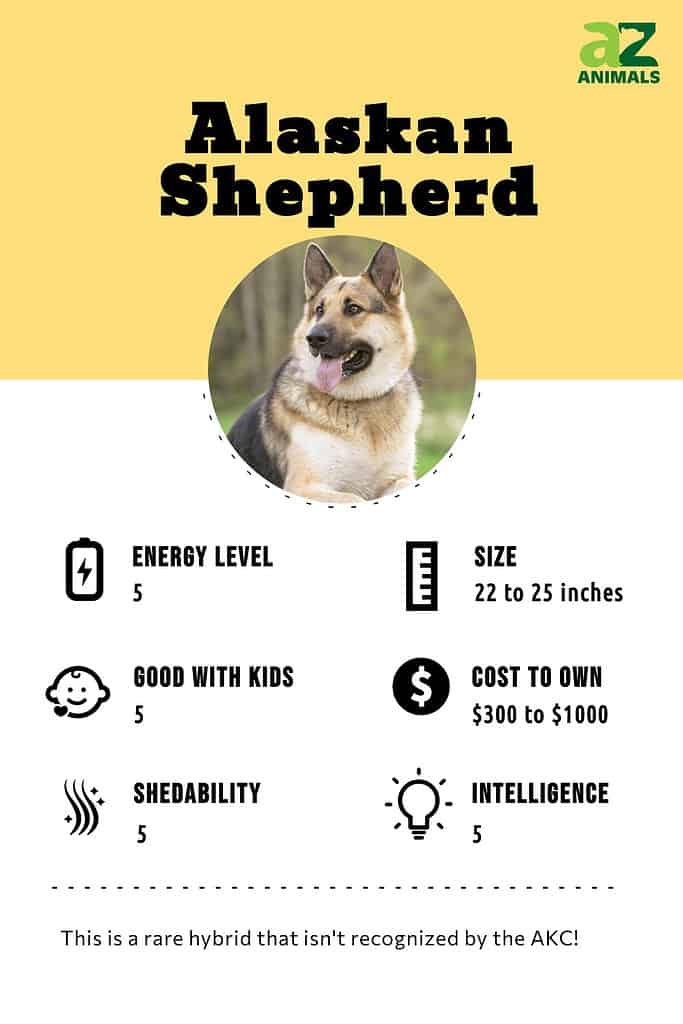
3 Pros And Cons Of Owning An Alaskan Shepherd
| Pros! | Cons! |
|---|---|
| Strong Work Ethic The Alaskan Shepherd thrives best when it has a task to perform. | Easily Bored The Alaskan Shepherd might resort to destructive behavior if it becomes bored. |
| Loyal and Protective This dog forms a deep and lasting bond with its owner. | High Maintenance This dog’s care poses a real challenge to its owner. |
| Intelligent This dog can be taught to perform a variety of different tricks and tasks. | Wary of Strangers Without proper training, this dog might be a little aggressive toward new people and dogs. |
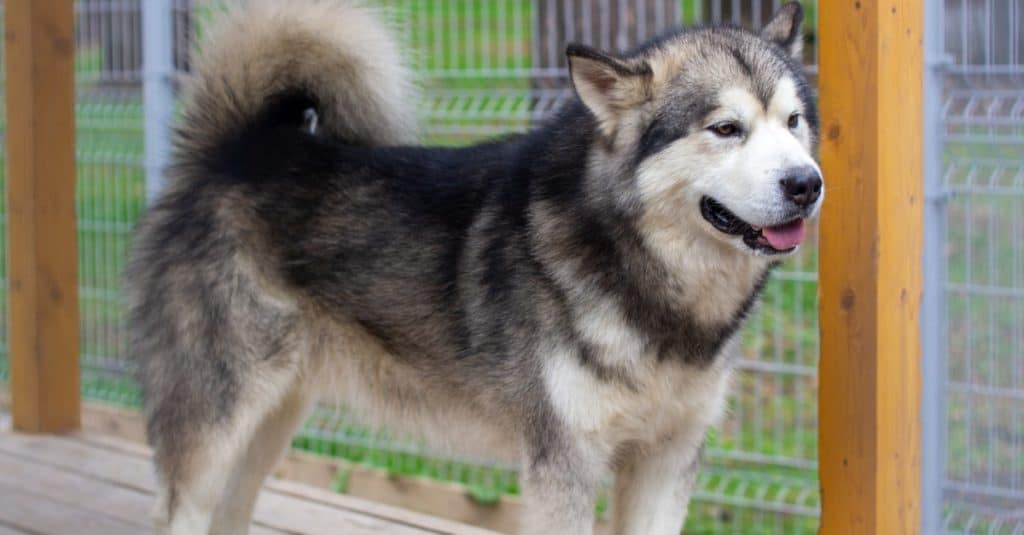
This breed will form a deep and lasting bond with its owners.
©ANATOLY Foto/Shutterstock.com
Size And Weight
The Alaskan Shepherd is a big, muscular dog with a strong work ethic and drive.
| Height (Male) | 23 to 25 inches |
| Height (Female) | 22 to 24 inches |
| Weight (Male) | 65 to 85 pounds |
| Weight (Female) | 60 to 75 pounds |
Common Health Issues
The Alaskan Shepherd is a decently healthy mix with a lifespan of some 10 to 13 years. Based on the health profile of its parent breeds, this dog may be prone to diabetes, cataracts, glaucoma, cancer, congenital heart defects, bleeding and clotting disorders, a bone inflammation disorder called Panosteitis, and various skin conditions. Another potential problem to look out for is exocrine pancreatic insufficiency, in which the dog is unable to properly digest some food. A good breeder will strive to reduce the risk of many health conditions, but it will still need regular examinations and tests at the vet to catch problems as early as possible. In summation, these are the most common health problems of the Alaskan Shepherd:
Health and Entertainment for your Alaskan Shepherd
See all of our expert product reviews.
- Diabetes
- Cataracts
- Glaucoma
- Cancer
- Heart Diseases
Temperament
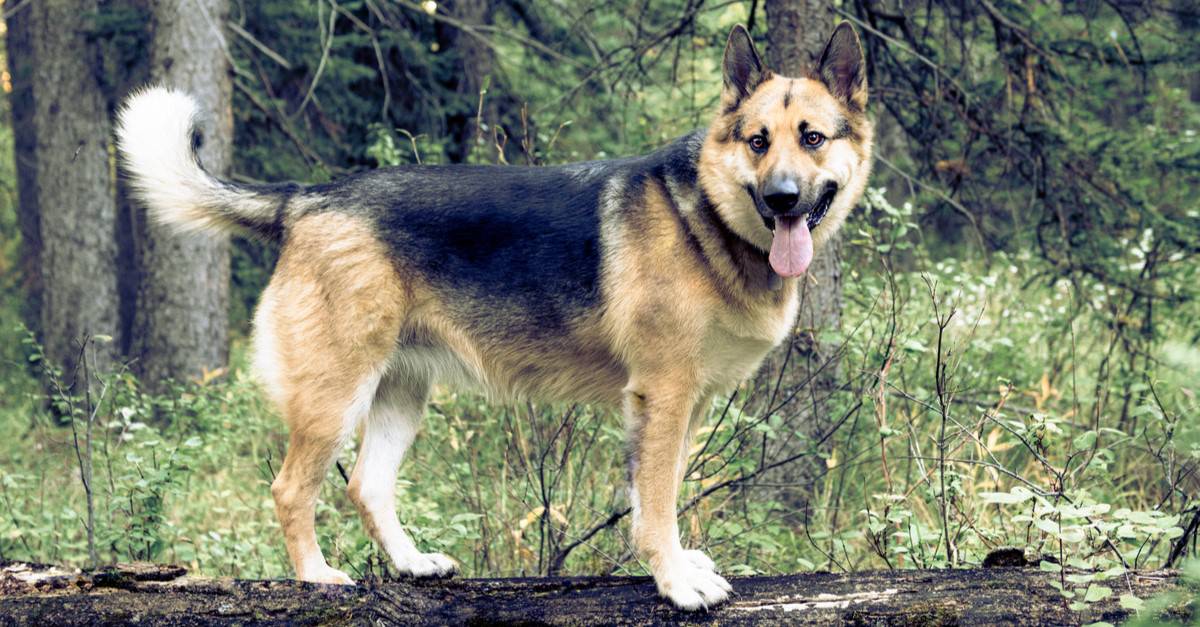
The Alaskan Shepherd is well-suited for use as a watchdog or service dog.
©iStock.com/bgsmith
The Alaskan Shepherd is a friendly, loyal, brave, protective, and hard-working dog. It tends to become attached to a single person at a time, but it has an indifferent and even slightly aggressive attitude toward new people and dogs. Proper training from an early age can help dispel some of this bad behavior. The Alaskan Shepherd does require an engaged owner who can give it plenty of tasks to do. Otherwise, if it becomes bored, this dog might become anxious and destructive. The Shepherd’s personality and traits make it well-suited for use as a watchdog or service dog. It also enjoys performing tricks, exercising with its owner, and engaging in general playtime and companionship. Keep in mind that as a crossbreed dog, every Alaskan Shepherd may have a slightly different temperament.
How To Take Care Of The Alaskan Shepherd
Due to its size and physical needs, the Alaskan Shepherd can be quite a difficult hybrid to care for. It needs plenty of space, lots of exercise and attention, a strong trainer, daily grooming/maintenance, and a lot of food. You don’t necessarily need to be an experienced owner, but it helps to have some idea of how to handle this type of dog. If you have any other questions or concerns about your dog’s care, then you should talk with your vet.
The Best Dog Food For Alaskan Shepherds
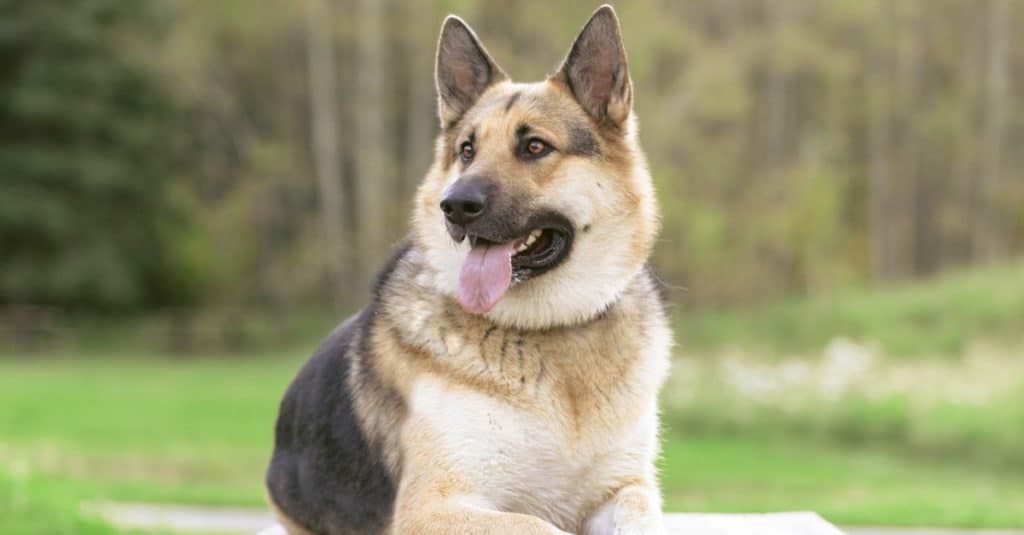
High-protein food may be a better-balanced diet for this breed.
©iStock.com/bgsmith
The Alaskan Shepherd needs about 2 to 3 cups of high-quality dry food per day; the exact amount will depend on the dog’s age, size, and activity level. But the Alaskan Shepherd does have a tendency to gain weight, so don’t leave out any more food than is necessary.
To rule out the chances of your Alaskan Shepherd suffering from diabetes, heart problems, cancers, and eye problems, find quality dog food with a complete nutritional profile.
A high-protein food like Purina ONE SmartBlend True Instinct Natural High Protein Adult Dry Dog Food could have a better balance for your Alaskan Shepherd.
The first ingredient in this food is high-protein beef, and the second ingredient is chicken. The quality protein sources can make it easier for an Alaskan Shepherd to maintain lean muscle. It also has Vitamin A for eye health, Thiamine for the heart, and zero mysterious fillers.
Check Chewy and Amazon for this product.
- High protein beef and salmon recipe for strong muscles and heart health
- Supports muscles, joints, and active lifestyle
- Omega 6 fatty acids for shiny coat and healthy skin
Maintenance And Grooming
The dog’s dense double coat of fur will need frequent grooming based on the time of the year. During the summer and winter seasons, the Alaskan Shepherd will require weekly brushes with a pin or slicker brush and a de-shedder. During the heavy shedding seasons of the spring and fall, however, it will need to be brushed almost daily. Dental hygiene is another important aspect of its care; you will need to brush their teeth every single day with high-quality canine toothpaste. You should also trim the nails and clean the ears with cotton whenever necessary to maintain good health. Finally, a bath should be given whenever the dog starts to become particularly dirty.
Training
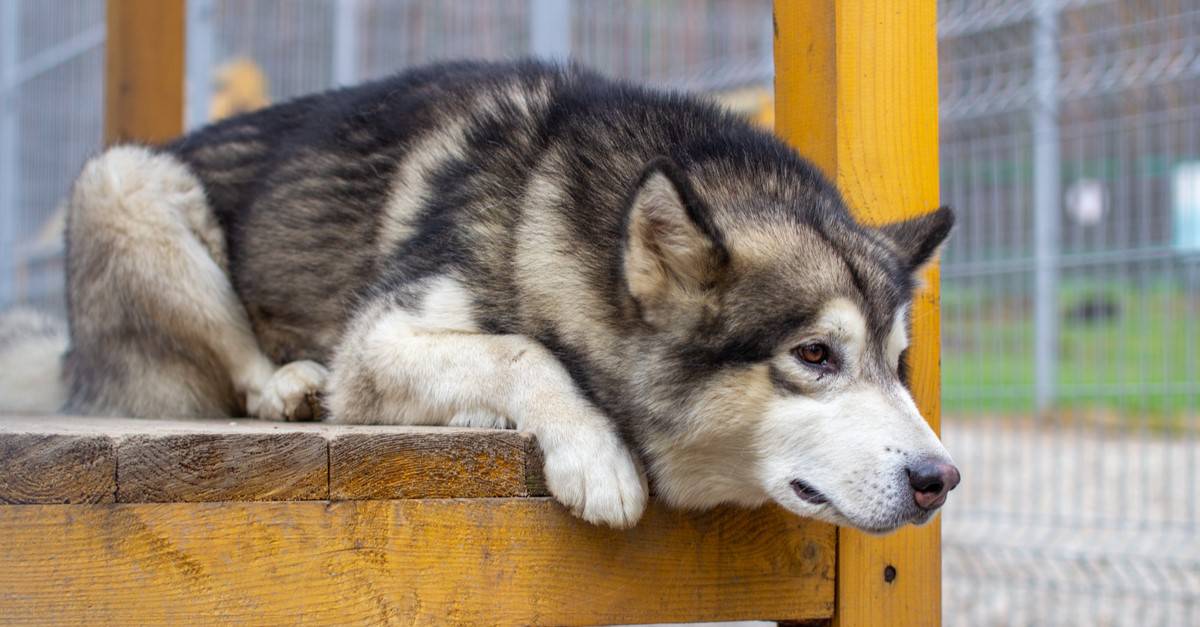
An intelligent working dog, the Alaskan shepherd will enjoy learning complicated tricks and tasks.
©iStock.com/ANATOLii SAVITSKii
The Alaskan Shepherd is an intelligent working dog that will enjoy the process of learning complicated new tricks and tasks. Keep in mind this is an independent and strong-willed dog with its own thoughts about how things should be done. The Alaskan Shepherd will therefore need a strong and respected leader with a firm and consistent hand to guide it. Just don’t be too harsh or aggressive; a positive attitude and training methods work best. If you are struggling to come up with a workable routine, then you might want to visit a professional trainer.
Exercise
As the product of two working breeds, this dog is a high-energy and high-endurance dog that will demand a lot from its owner physically. It needs at least an hour of exercise every day, from basic walks and playtime to more strenuous hiking and runs. A large yard, dog park, or other large space is definitely recommended to let it roam freely. But keep in mind that the Alaskan Shepherd, with its thick double coat, will need plenty of shade and rest in hot weather.
Puppies
From the moment of their birth, the puppies are big, energetic, and enthusiastic dogs that will need plenty of early training to curb some of their worst instincts. Puppies will benefit from exposure to new people and situations, as well as crate and house training, in the first few months of life to produce a well-behaved adult. Obedience training should probably begin after about three months of age. However, even after they undergo proper training, these dogs may not truly mellow out until they have fully matured after the first two years.
Alaskan Shepherds And Children
This dog is loyal and protective of children. However, parents should be careful about letting it interact with smaller kids since the dog’s large size and bold temperament might be intimidating.
Dogs Similar To The Alaskan Shepherd
Besides the Alaskan Malamute and the German Shepherd, these dogs bear a strong resemblance to the following types of dogs:
- Siberian Husky – This large working dog was originally bred by the Chukchi people of northeastern Asia for the purpose of a companion and a sled dog. Their friendly and infectious personality, strong and athletic build, and bold demeanor all combined to make them one of the most popular breeds in the United States. Black, white, and grey are the most common colors, but there are also red, sable, and tan.
- Alusky – A cross between an Alaskan Malamute and a Siberian Husky, the Alusky combines many aspects of its two purebred parents. It is a big, strong, athletic, friendly, and outgoing dog that forms a strong bond with its owner.
- Shepsky – This cross between a German Shepherd and a Siberian Husky is an affectionate and loyal working dog with a history of police work, search and rescue, and guard duties. It also needs a strong pack leader to guide it.
Famous Alaskan Shepherds
The Alaskan Shepherd is a relatively obscure dog without a significant following, despite the fact that its two parent breeds are quite popular. The Alaskan Malamute is well-known as a sled dog, and the German Shepherd is one of the most popular breeds in the world. In fact, one of the most famous dogs of all time, the actor Rin Tin Tin, was a German Shepherd rescued from a World War I battlefield in France.
Popular Names For The Alaskan Shepherd
If you are looking for a good puppy name, then you might want to consider the following options:
- Rocky
- Moose
- Heidi
- Atka
- Kima
- Blitz
- Zeus
- Bear
- Nanook
- Siku
Alaskan Shepherd FAQs (Frequently Asked Questions)
What is an Alaskan Shepherd?
The Alaskan Shepherd is a mix between an Alaskan Malamute and a German Shepherd. This big, strong, athletic, and intelligent crossbreed dog has many appealing traits for very attentive and engaged owners. Coat colors include black, white, brown, red, and blue.
Are Alaskan Shepherds good pets?
That depends on what you are looking for in a pet. The Alaskan Shepherd is intended for owners who want a very engaging, loyal, and athletic dog and won’t mind spending a lot of time and effort on its care. This is not a simple companion dog that will do well with a minimalistic approach. Potential owners need to be fully prepared for a high maintenance but highly rewarding pet.
What is the price of an Alaskan Shepherd?
The price of an Alaskan Shepherd is around $300 to $1,000. Dogs with a particularly strong heritage and pedigree will obviously cost a lot more than average. But an adopted dog from a shelter or rescue will tend to have a lower price.
What is the temperament of an Alaskan Shepherd?
The Alaskan Shepherd has a friendly, brave, and loyal personality. With proper training, it should adopt a protective and obedient attitude toward its owner, with whom it tends to form a very strong and close bond.
How long do Alaskan Shepherds live?
The Alaskan Shepherd has a lifespan of around 10 to 13 years on average. If your dog can avoid any serious health problems, then there’s a good chance it can live a few years beyond this.
Thank you for reading! Have some feedback for us? Contact the AZ Animals editorial team.
Sources
- Wag Walking, Available here: https://wagwalking.com/breed/alaskan-shepherd
- Doggie Designer, Available here: https://doggiedesigner.com/alaskan-malamute-german-shepherd-mix/



















